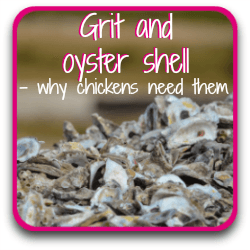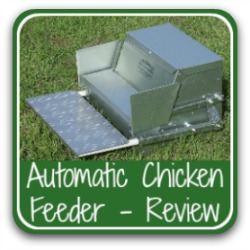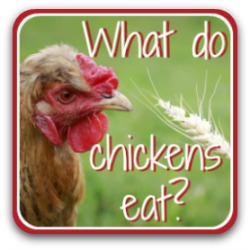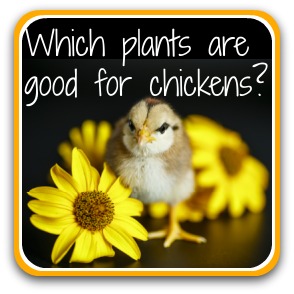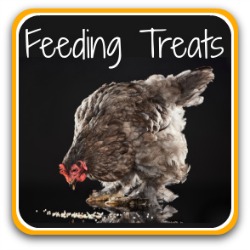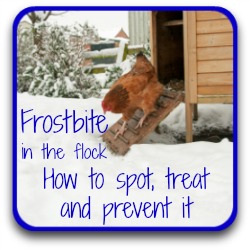From hatch to old age: what should chickens eat?
Chickens should eat different types of food at different times of their life. Here's the why, the what and the when.
Use these links to jump to a specific section.
Want a free downloadable summary of chicken feed at different life stages?
My newsletter subscribers get a download for free, twice a year. It summarises the information contained on this page about which feed to provide at different ages, including how much protein and calcium each should contain.
Not signed up for my Chicken Digest newsletter yet?
It's critical to your chickens' development that they get the right balance of protein, fats, carbohydrate and vitamins.
If you're anything like me, you will be completely confused as a new chicken keeper.
When I started keeping chickens I couldn't work out what that balance was, and the information was scattered all over the internet.
I wrote this article so that you won't be confused. It's based on my own experience together with information I've learned from these reliable sources.
Which is best - commercially produced or 'make-it-yourself'?
Many people worry about the contents of commercial food and so would like to make their own.
Personally I don't do this for one simple reason: the balance of nutrients is a very delicate one which commercially produced feed has come to by scientific methods.
It's very difficult to get the balance right when making your own. And an unbalanced diet can create health problems in the flock which I'm not prepared to risk.
It's not hard these days to find a source of food which is organic, free of antibiotics and free of genetically modified ingredients.
I recommend some good quality products during the course of this article. But you don't need to follow my recommendations, and buying locally is likely to be less expensive.
Ask at your feed store for a good quality product which is chemical and GMO free. The important thing is to make sure it's the right feed for the stage of development of your chickens.
 Free ranging your flock is great if you can do it - but what else should chickens eat?
Free ranging your flock is great if you can do it - but what else should chickens eat?What should you feed baby chicks? From hatch to about 7 - 8 weeks.
If you purchase a product through links on this page, I may receive a small commission at no extra cost to you. I only recommend products I have bought (or would buy) myself, and which I believe will genuinely benefit you. You can read my full disclosure policy here.
- Chicks at the point of hatch do not need to eat immediately. The egg yolk which they absorb in the last day before hatching will keep them nourished for the first 24 to 48 hours.
- After that they should be given a chick starter feed, also known as "chick crumbs". It's specially formulated with the high levels (about 20%) of protein and vitamins chicks need during this stage of rapid growth.
- For the first couple of days, sprinkle it on some kitchen paper in their brooder box. The noise of the crumbs dropping will stimulate them to peck. After that, they can graduate to a chick feeder.
 Dropping chick crumbs onto kitchen paper will stimulate chicks to investigate by pecking.
Dropping chick crumbs onto kitchen paper will stimulate chicks to investigate by pecking.- Leave the food available to them all the time. They're not like puppies – they will regulate how much they eat.
- To make sure they're getting a balanced diet, chicks need to fill up on this before you give them any treats.
- For advice about providing treats to young chicks, take a look at my article about gourmet treats for baby chicks.
- Chicks should eat starter crumbs until they are about two months old.
Why 'about' two months?
- Different feeds will have different recommendations according to the levels of protein they contain. You should take note of what is recommended on the product.
- If there's no recommendation, use the two month (8 week) point as the time to change – but don't panic about it. A week or so either way won't make much difference.
- If you have chick crumbs left over at the eight week point, mix it with increasing quantities of grower feed. That way, the chicks graduate from one to the other over a period of a couple of weeks.
- Don't leave any grain lying around thinking you'll use it with the next batch of chicks. It has a nasty habit of absorbing moisture and going mouldy which will cause major issues for the wellbeing of your next hatch.
Grower feed: Pullets and cockerels (roosters) from 8 weeks to about 18 weeks.
Both male and female chickens should be moved from chick feed to a grower feed at around 8 weeks. They should remain on this until shortly before "point of lay" – the age when females begin to lay eggs.
- Grower food contains less protein than the starter – around 16% - 17%. Chickens just don't need as much, as growth slows down.
- It's important not to overdo either protein, as found in starter crumbs, or calcium which is found in 'layer' feed. Both can do serious damage to the kidneys.
- A commercially produced grower product will ensure that your flock eats exactly the right balance of nutrients at the point of need.
 Encouraging your growing birds to eat from your hand makes them easy to handle later.
Encouraging your growing birds to eat from your hand makes them easy to handle later.Why 'about' 18 weeks?
- 'Point of lay' is usually around 20 - 21 weeks, but chickens are not robots! Some are much later. Around 30 - 35 weeks is not uncommon for larger breeds, and some individuals just take a long time to get into the swing of things. I have had a hen not begin laying until she was a year old and I had almost given up on her ever giving me a single egg.
- Again, don't leave food lying around if your chickens reach 18 weeks and you have some grower feed left over. It's fine to mix it with their "big girl" food so they graduate from one to the other over a couple of weeks.
- Leaving it for your next batch of pullets runs the risk of it absorbing moisture and developing a mould which can be fatal.
Layer feed : Point of lay onwards.
- From just before the point they begin to lay eggs, chickens should eat a good quality layer feed, which is balanced to make sure hens get the correct levels of calcium to promote healthy bone growth.
- Adult hens need less protein but more calcium and phosphorous than youngsters. A typical layer product will contain around 15% protein but an increased calcium ratio of about 2%.
- Despite the increased calcium, making an egg requires a larger amount than feed alone can give. For this reason, laying hens need additional calcium, fed in a separate container.
- For more information about this see this article about oyster shell which will open in a new window so you can come back and finish reading this page.
 Laying hens need more calcium and less protein than youngsters.
Laying hens need more calcium and less protein than youngsters.- Layer food comes in either pellets or 'crumbles' (sometimes also called 'mash') and it really doesn't matter which you get – the content is the same. Pellets tend to be a little less messy as they're not as easy to kick out of the feeder.
- Chickens should have layer pellets or crumbles available to them all day. You don't need to worry about them over-feeding themselves; they're very good at regulating the amount they eat.
- Make sure you either use a rodent-proof feeder, or take the food up at night. Your flock won't eat after dark anyway, and leaving grain around is a sure way to attract rats to your coop, as I found out to my cost.
What should roosters (cockerels) eat?
- Roosters need a diet which is lower in calcium than hens. I have a detailed article about the evidence for this, and how to manage it in a mixed flock.
Should chickens eat medicated or unmedicated food?
- Poultry food can be found in both medicated and unmedicated form and it's a question I'm often asked: should chickens eat a medicated feed?
- A medicated product protects against (but does not cure) the disease coccidiosis, an infection of the digestive system which is most common in young chicks and can be fatal. It tends to breed in warm, moist conditions.
- Personally, I have never used medicated products with any of the chicks I've hatched myself, nor with any of my adults. I keep my chickens and their environment clean and dry, so don't see the need.
- Through good animal husbandry, I have never had a problem with chicks picking up any form of illness or virus. I prefer them to build up their own immunity.
Why do people recommend it?
- Chickens hatched in large-scale commercial farms are given medicated feed because they're raised in close proximity to other birds, often with insufficient space and, sadly, in less than ideal conditions.
- They are far more likely than a backyard flock to develop illnesses which then spread very quickly across the entire flock.
 Even chickens described as 'barn-raised' are often in crowded conditions and need medicated feed.
Even chickens described as 'barn-raised' are often in crowded conditions and need medicated feed.- Some people who raise backyard flocks decide to give a medicated feed as a kind of 'just in case' insurance against coccidiosis.
- Of course, it's a decision you must come to personally. But if your flock is well cared for, it's my opinion that there really should be no need.
Genetically Modified Organism (GMO) feed.
GMO feed has been given to chickens in the commercial farm industry since the mid-1990s. Many food products available to backyard chicken owners contain genetically modified corn.
Government departments will state categorically that :
"There is no food safety — or any other risk — to the health and well-being of consumers when they consume chicken or other animal agriculture products (e.g. eggs, dairy), which have been raised with genetically modified feed ingredients". (National Chicken Council, 2012).
Despite this, many individuals do not wish to give genetically modified feeds to their chickens. It is entirely possible to buy products which have no genetically modified ingredients.
Any product that has the label 'Certified Organic' is not permitted to use GMO ingredients. It will generally also be prominently labelled 'Non GMO'.
The only drawback of non-GMO feeds is that they tend to be more expensive. But many backyard chicken owners, including me, feel the additional cost is worth it for the peace of mind of feeding a natural, organic product.
More about grit and oyster shell.
Grit and oyster shell are two very different things, both essential for a healthy chicken diet.
Chicks should eat grit as soon as they begin to eat anything apart from commercial feed.
Laying hens need to eat oyster shell from the point immediately before they begin to produce eggs.
This article deals with why they're such a critical part of the diet, when to start providing and how to offer them safely.
Here's more information about feeding chickens.
Sources and further reading.
A lot of "facts" you'll find on the internet are often people's individual views, based on inaccurate information repeated from poor quality sources.
The information I provide in this article and others is based not just on my own experience, but on evidenced facts from scientific, peer-reviewed research and books from highly respected and experienced poultry keepers such as Gail Damerow.
Some of the trusted sources I have used in this article are these.
1. U.S. Food and Drug Administration : 'Foods derived from genetically engineered plants'. Pub. April 2013.
2. The Chicken Vet : 'Coccidiosis'. Pub. St David's Poultry Team, UK, 2014.
3. Ussery, Harvey : 'The Small Scale Poultry Flock : An all natural approach to raising chickens and other fowl for home and market growers'. Pub. Green Press, 2011.
4. Extension (US Research-based Learning Network : 'Feeding Chickens for Egg Production'. October 2014.


